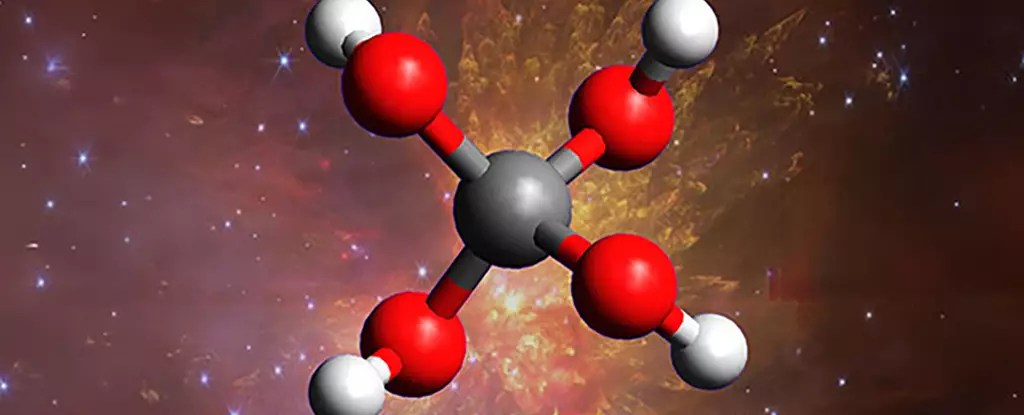In recent scientific breakthroughs, the creation of methanetetrol—a molecule once deemed impossible—has spotlighted the astonishing complexity of interstellar chemistry. However, beneath this achievement lies a deeper, more unsettling reality: our understanding of the universe’s chemical landscape remains shockingly superficial. The laboratory replication of such a volatile molecule does not necessarily translate into its existence or prevalence in the cold vacuum of space. Instead, it exposes how much we have yet to grasp about the true nature of cosmic phenomena, raising questions about the reliability of our assumptions and the risks of overly optimistic interpretations of scientific progress.
While researchers celebrate the detection of an unanticipated molecule, it’s critical to recognize that these experiments are heavily constrained by artificial conditions. The universe’s vast, unpredictable environment cannot be fully recreated in labs, nor can it guarantee that these molecules form naturally at significant scales. The risk, often overlooked amidst the enthusiasm, is that such discoveries could be misinterpreted as evidence of widespread chemical processes, leading to potentially flawed models of star formation, planetary chemistry, and the origins of life. The unsettling truth is that our current technologies only brush the surface of cosmic complexity, leaving us vulnerable to premature conclusions based on fragile, transient molecules.
The Mirage of Cosmic Certainty and the Danger of Overreach
The line between scientific curiosity and overconfidence is dangerously thin when it comes to space exploration. The identification of methanetetrol—so unstable that it disintegrates upon exposure to light—serves as an unsettling metaphor for the fragility of our understanding. We are rapidly discovering things that defy our expectations, yet we often leap to conclusions about their significance without adequate evidence. This tendency fuels a dangerous cycle: as scientists find “impossible” molecules, they speculate on their implications with unwarranted certainty, thereby inflating the importance of findings that are, at best, tentative glimpses into an alien chemical universe.
This speculative optimism can divert attention from more pressing, tangible challenges—like the ecological crises on Earth, the moral dilemmas of emerging technology, and the geopolitical risks of space militarization. The allure of cosmic discovery, if unchecked, risks fueling a form of scientific hubris that overestimates our capacity to decode the universe’s chemical secrets without understanding the full context. Just as the discovery of methanetetrol is fleeting and fragile, so too must be our claims about the universe’s chemical complexity. We should approach these findings with humility, recognizing how little we truly know and how easily we might be deceived by the universe’s apparent openness to our theories.
Approaching Space with Caution and Critical Skepticism
The promise of finding molecules like methanetetrol stirs a mix of awe and caution. Yes, these discoveries push the boundaries of human knowledge and spark invaluable questions about the origins of life and cosmic evolution. Yet, they also highlight how little we can confidently say about the universe beyond our planet. The over-optimism surrounding such findings runs the risk of oversimplifying space’s formidable complexity. It’s tempting to imagine that these molecules, once detected or theorized, herald an imminent revolution in astrobiology or our understanding of cosmic life, but the reality is far more nuanced and uncertain.
Furthermore, the challenges of detecting these unstable molecules in deep space are formidable—if not impossible—due to their fleeting existence and propensity for dissociation under light exposure. This difficulty underscores how fragile and elusive the universe’s chemical diversity truly is. Instead of rushing to interpret every new molecule as a signpost of cosmic life or advanced chemistry, we should adopt a cautious, skeptical stance, emphasizing the importance of corroborating findings, improving detection methods, and acknowledging our epistemic limits.
In embracing this critically cautious approach, we avoid the pitfalls of overinflated claims and speculative narratives that often accompany space discoveries. True scientific progress requires patience, humility, and an openness to revising assumptions as new evidence emerges. As our telescopes grow more powerful and our laboratory techniques more refined, a sober perspective rooted in critical skepticism will serve as our best safeguard against the allure of superficial discovery. Navigating the frontiers of space chemistry demands not just curiosity but also a disciplined skepticism—lest we chase shadows that shape a misleading picture of the universe’s true nature.

